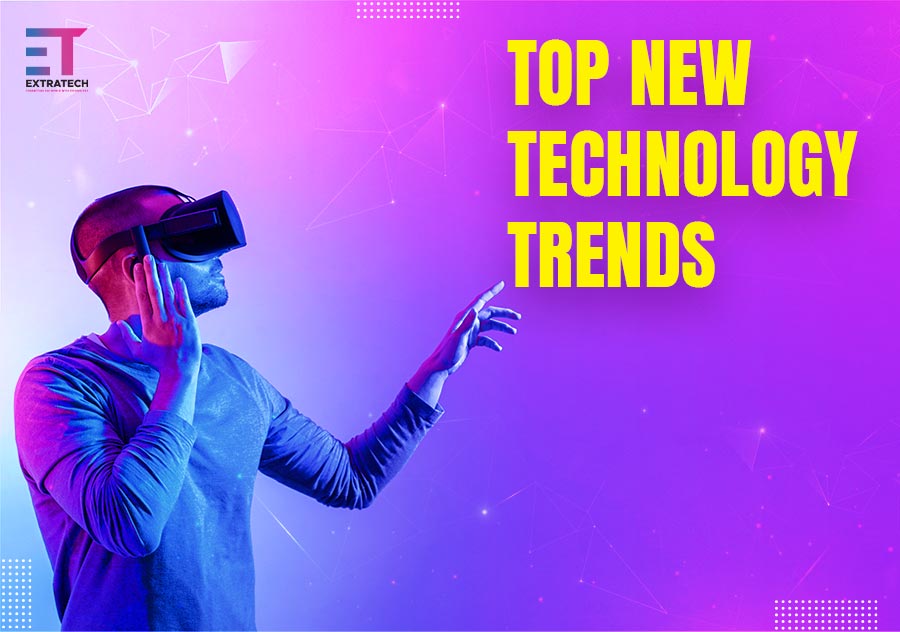


2023-04-27
As we move into the year 2025, several emerging technologies will shape the future of our world.
Technology will lead to increased efficiency, productivity, and cost savings for businesses, while also providing consumers with more personalized experiences and better access to information. Keeping up with these technology trends is important to stay relevant in today's fast-paced world.
In this blog, we will explore the top new technology trends, highlighting their applications and impact on our lives. Whether you are a tech enthusiast or simply interested in the future of technology, this blog is for you.
Let's dive in!
Artificial Intelligence (AI) and machine learning are some of the most transformative technologies of our time, with applications in almost every sector of the economy. We can expect AI and machine learning to become even more prevalent, powering automation and data analysis tools.
AI technology will enable businesses to automate repetitive tasks and reduce errors, leading to increased productivity and cost savings. Machine learning applications will allow for more accurate and efficient data analysis, enabling businesses to gain insights into consumer behaviour and market trends.
The rise of robotics and automation is revolutionizing the way we work. With advancements in robotics technology and automation software, robots are taking over manual labour tasks that were once done by humans.
We can expect to see an increase in the use of robotic process automation (RPA), which involves automating repetitive tasks using software robots. This will free up human workers to focus on more complex tasks that require critical thinking and creativity.
Cloud computing has transformed the way we store and access data. The cloud computing services will continue to evolve, making data storage easier and more accessible than ever before.
Cloud storage solutions will provide businesses with secure, scalable, and cost-effective storage options, enabling them to store and manage large amounts of data with ease. With cloud computing, businesses will be able to access their data from anywhere in the world, increasing collaboration and productivity.
5G networking is the next generation of wireless technology, offering faster connectivity and lower latency than previous generations. We can expect to see widespread adoption of 5G technology, enabling businesses to increase their efficiency and productivity.
With 5G network speed, businesses will be able to transfer data faster than ever before, improving communication and collaboration. 5G network latency will be significantly lower than in previous generations, providing a seamless user experience for consumers.
Augmented Reality (AR) and Virtual Reality (VR) are transforming the way we experience the digital world. The AR and VR applications will become even more prevalent, enhancing our experiences in various industries such as gaming, healthcare, education, and retail.
AR technology will enable businesses to create immersive experiences for customers, allowing them to interact with products in new and exciting ways. VR technology will provide a realistic and interactive environment for training and simulation, enabling businesses to train employees more efficiently.
Blockchain technology is a decentralized system that allows for secure and transparent data storage. We can also expect to see an increase in the use of blockchain technology, particularly in the finance and healthcare sectors.
Blockchain technology will revolutionize data security, making it virtually impossible for hackers to breach sensitive information. The technology will also provide transparency, allowing consumers to have more control over their data.
The Internet of Things (IoT) refers to the network of physical devices that are connected to the Internet, enabling them to communicate with each other and with humans. The IoT technology will continue to connect more devices, leading to greater efficiency in industries such as healthcare, transportation, and manufacturing.
Connected devices will allow for more efficient and automated processes, leading to cost savings and increased productivity. Smart home systems will become even more prevalent, allowing homeowners to remotely control various aspects of their homes.
Quantum computing is a technology that uses quantum mechanics to perform calculations that are impossible with classical computers. We can also expect to see advancements in quantum computing technology, leading to accelerated scientific discoveries.
Quantum computing technology will enable researchers to simulate complex systems and molecules, leading to drug discovery, materials science, and artificial intelligence breakthroughs. The technology will also provide more secure encryption methods, protecting sensitive data from hackers.
You can also read our previous blog discussing new trends for designing your website: 10 Web Design Trends to Enhance Your Customer Experience For 2025
The future of technology is exciting, and the trends we've discussed in this blog will undoubtedly shape our lives in profound ways. Whether you're a business owner, a student, or simply someone who is interested in the future of technology, there are several ways to stay engaged.
The impact of these technology trends on our lives is immense, and it's up to us to make the most of it. So, what are you waiting for? Start exploring these emerging technologies and discover how they can transform your business and your life.
Please take a look at our list of Job Ready Programs to ensure that you stay informed about the latest skills and trends, and remain ahead of the competition or Discover the B2B Marketing Trends of 2025 and Beyond to Maximize Your Business Impact.